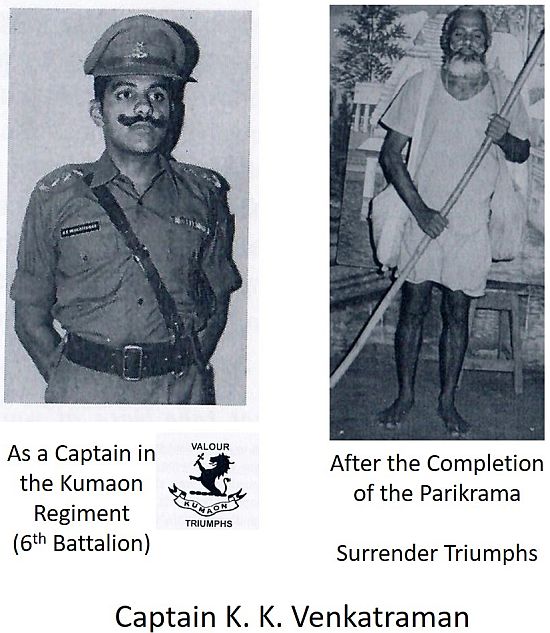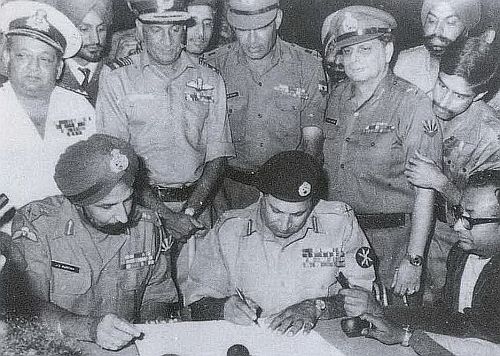Latest Contributions
Victory day of the 1971 war
Category:

Krishnan K. Sankaran studied metallurgical engineering at the Regional Engineering College, Durgapur, IIT Madras, and Massachusetts Institute of Technology, from where he received his Ph.D. degree in 1978. In 2012 he was elected as Honorary Member of the Indian Institute of Metals for his distinguished services and significant contributions to the metallurgical profession and research. He retired in 2014 after working for 36 years in the aerospace industry. He recently published a book titled Metallurgy and Design of Alloys with Hierarchical Microstructures (Elsevier, June 2017). He now devotes his time to learning Carnatic music, Sanskrit and Hindu scriptures, and to traveling.
My elder brother, Sri K. K. Venkatraman was a Captain in the Kumaon Regiment of the Indian Army in the late 1960s and early 1970s. He actively participated in the 1971 India-Pakistan War. After the war, he joined Vivekananda Kendra, Kanyakumari (the southern tip of India), and administered their residential schools for the tribal children in the Northeastern state of Arunachal Pradesh (erstwhile NEFA), bordering China.
In 1987-88, he undertook Narmada Parikrama. This is a unique pilgrimage - a clockwise circumambulation of Narmada River. It is a 2,500 km sacred barefoot walk along the banks of the Narmada. The Parikrama can start anywhere on the river's banks but has to proceed in one direction only, and return to the origin without crossing the river anywhere. At the point where the river merges into the sea, the parikramavasis (walkers) go sufficient distance into the sea by boat to go around, and ensure that Narmada is not crossed.
He walked for 131 days all alone without money, surviving on Bhiksha (offered/ sought food).
Recently, his students have published a book on his experiences titled Walking With The Immortals as a Guru Dakshina (Offering to the Teacher). The book gives a deep insight into the rich culture of India. It is amazing to know that he received Bhiksha from the illiterate, economically poor villagers with reverence and love in the true Indian tradition - Atithi Devo Bhava.

***.
This is what he experienced on 16 December 1987, which was Day 52 of his walk.
***.
This day (December 16) has great significance for the Armed Forces. It was on this day in the year 1971 that Pakistani troops in East Pakistan surrendered to the Indian Army. The Instrument of Surrender was signed by the Pakistan Army Commander in East Pakistan and presented to the Indian Army Commander (Eastern Command) at 4.30 P.M. in Dacca, paving the way for the liberation of East Pakistan and the creation of Bangladesh.

Lt Gen Niazi signing the Instrument of Surrender under the gaze of Lt Gen Aurora . Standing immediately behind from L to R: Vice Admiral Krishnan, Air Marshal Dewan, Lt Gen Sagat Singh, Maj Gen JFR Jacob (with Flt Lt Krishnamurthy peering over his shoulder). Veteran newscaster, Surojit Sen of All India Radio, is seen holding a microphone on the right.
The ceasefire in the Western Sector, where bloody battles were fought for 14 days (3-16 December 1971) came into effect from 6.00 P.M.
Since then, this day is observed as Vijay Diwas (Victory Day).
During the previous five days, while we were walking through the forest, the entire group was chanting and singing the glory of Mother Narmada all the time. Now walking alone, I could not resist recalling the events of the last day of the War, which was code-named "Operation Cactus Lily".
Our Battalion fought along the Samba (near Jammu) - Lahore axis. Our Division crossed the international border and moved southward towards Lahore. We were ordered to halt few kms short of the city. We remained inside Pakistan for almost a year. We returned to India leaving the captured territory as per the Shimla Pact signed by Indian Prime Minister Indira Gandhi and Pakistani President Zulfikar Ali Bhutto.
On 16 December 1971, as the war ended, the entire Nation was celebrating the Victory. Of course, the Armed Forces were also happy. However, it was also a solemn occasion. During the war, as we were fully engaged in fighting, there was no time to think of the loss of our dear colleagues who were killed in action.
This thought started haunting us after the ceasefire. Especially, we Officers in small posts occupied by a group of about 100 soldiers under the command of a lone Officer (Captain) found it extremely difficult to overcome the grief. We used to shed tears during the nights in solitude. We had all faced enemy bullets together, and some had been hit fatally.
I underwent the same experience on this day (night) of the Parikrama in solitude, as I had left the group in the morning.
______________________________________
© Krishnan Sankaran 2017
Instrument of Surrender of Pakistan forces in Dacca
December 16, 1971
INSTRUMENTS OF SURRENDER OF PAKISTANI FORCES IN DACCA
Dacca
The Pakistan Eastern Command agree to surrender all Pakistan Armed Forces in Bangladesh to Lieutenant General Jagjit Singh Aurora, General Officer Commanding-in-chief of the Indian and Bangladesh forces in the eastern theatre. This surrender includes all Pakistan land, air and naval forces as also all Para-military forces and civil armed forces. These forces will lay down their arms and surrender at the places where they are currently located to the nearest regular troops under the command of Lieutenant-general Jagjit Singh Aurora.
The Pakistan eastern command shall come under the order of Lieutenant General Jagjit Singh Aurora as soon as this instrument has been signed. Disobedience of orders will be regarded as a breach of the surrender terms and will be dealt with in accordance with the accepted laws and usages of war. The decision of Lieutenant-General Jagjit Singh Aurora will be final, should any doubt arise as to the meaning or interpretation of the surrender terms.
Lieutenant-General Jagjit Singh Aurora gives a solemn assurance that personnel who surrender shall be treated with dignity and respect that soldiers are entitled to in accordance with the provisions of the Geneva Convention and guarantees the safety and well being of all Pakistan military and Para-military forces who surrender. Protection will be provided to foreign nationals, ethnic minorities and personnel of West Pakistan origin by the forces under the command of Lieutenant-General Jagjit Singh Aurora.
|
Sd/- Eastern Command |
Sd/- and Commander, Eastern Command |
Comments
Add new comment